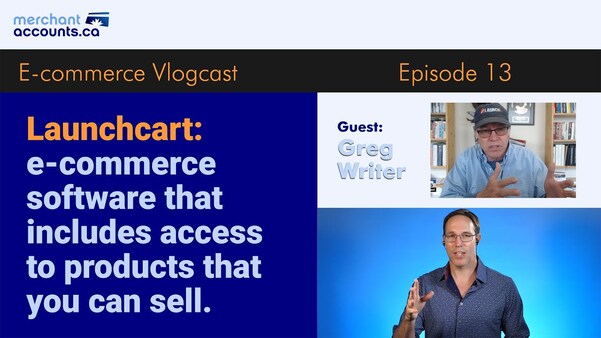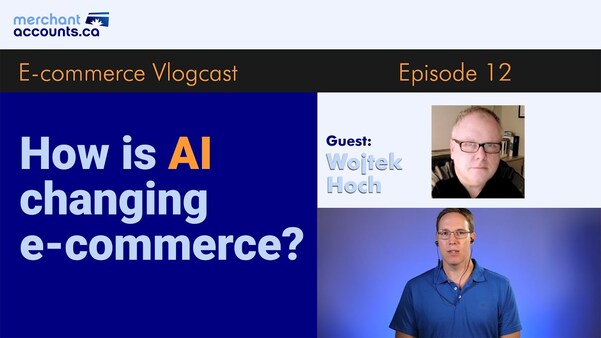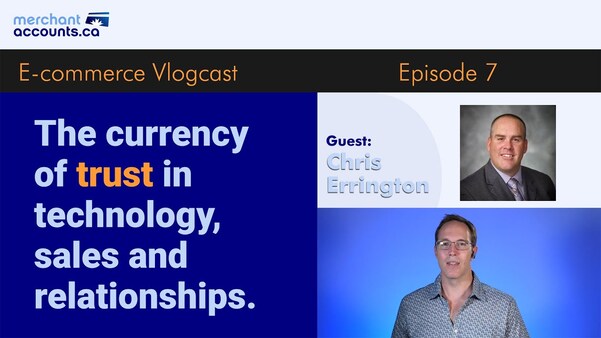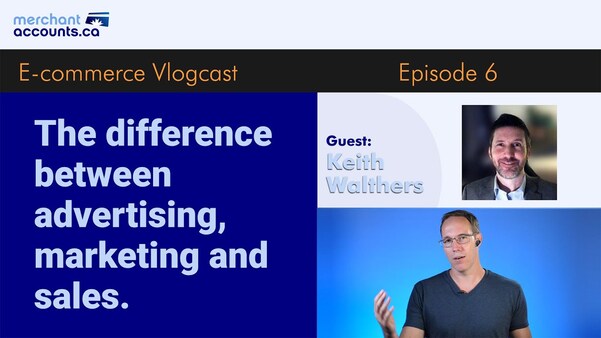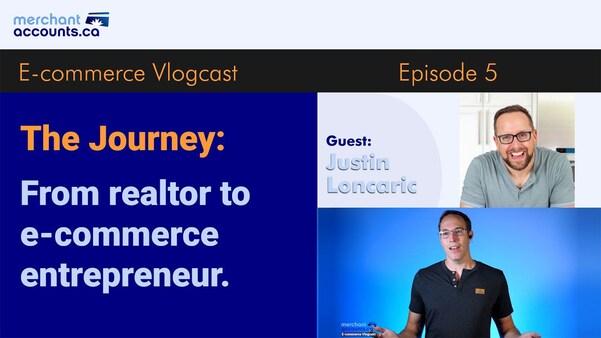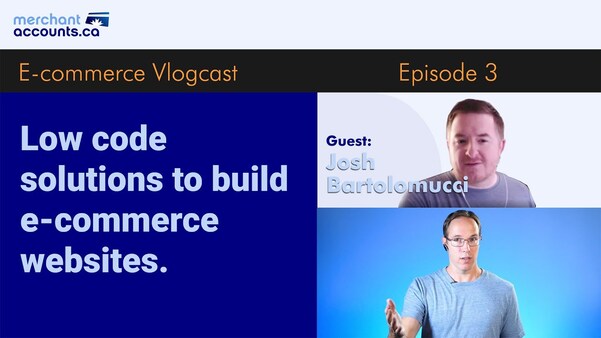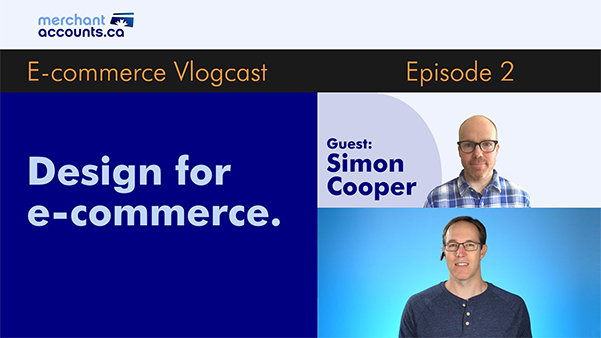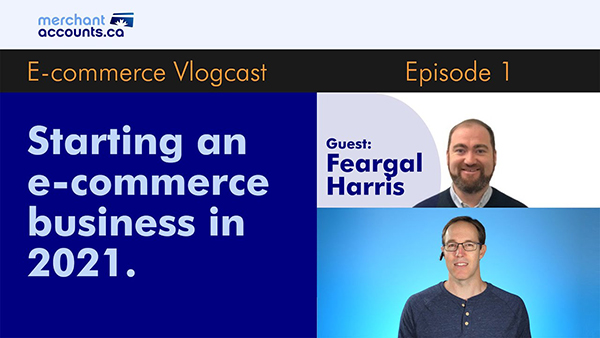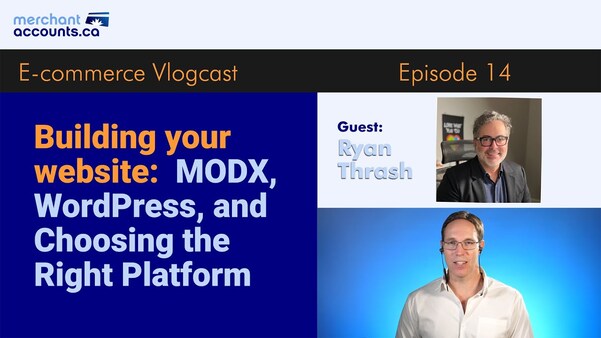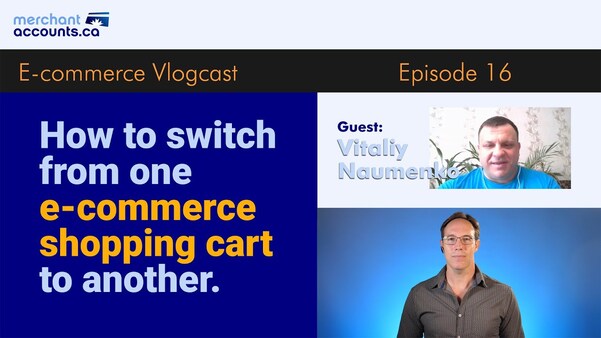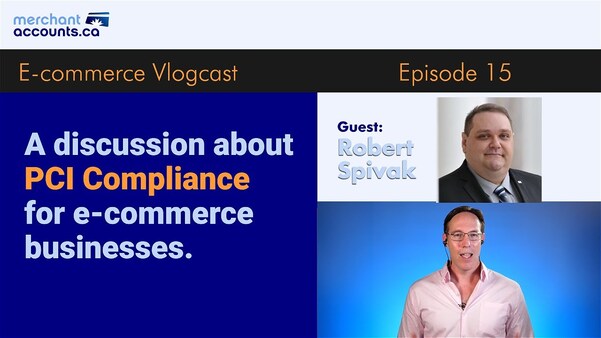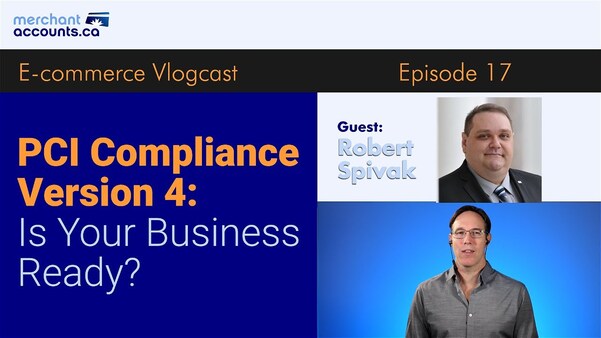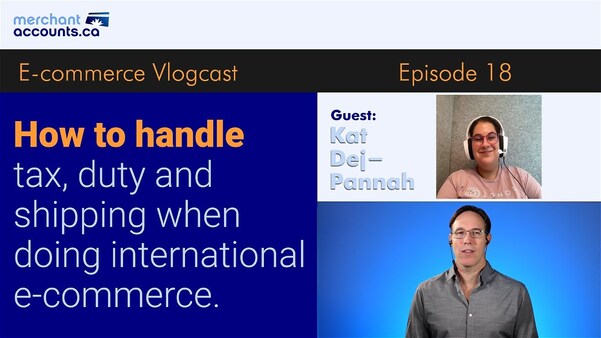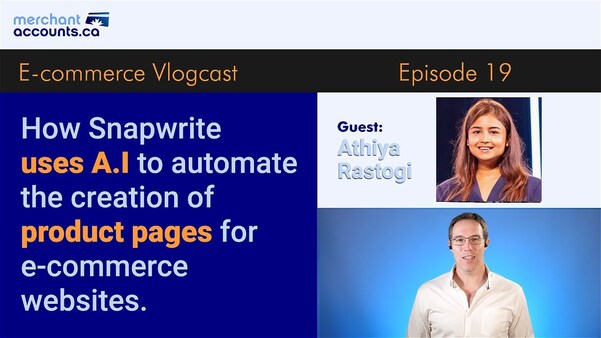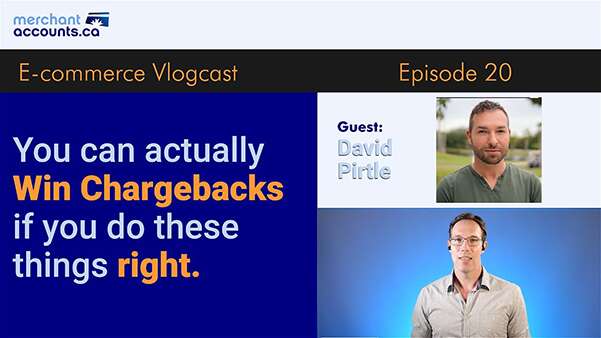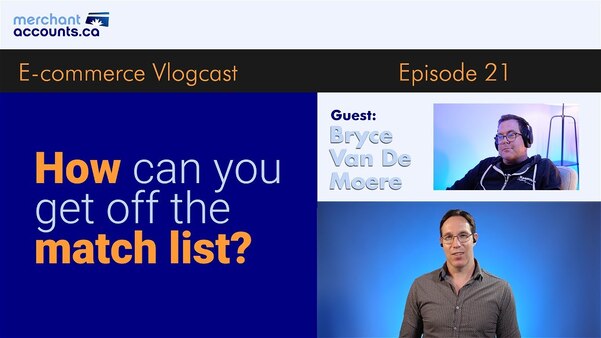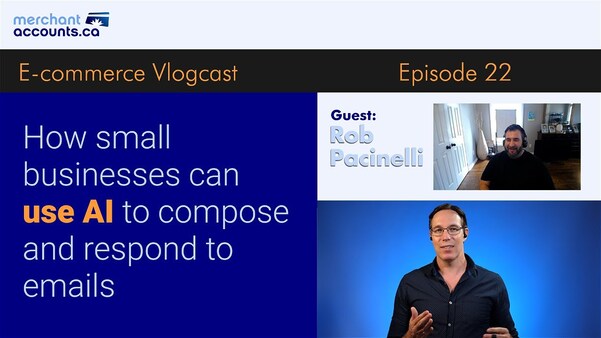August 29, 2022
by David Goodale
How to choose CRM software for an e-commerce business
(Slightly edited from video transcript for greater readability)
David Goodale:
Hello, David here at Merchant-Account.ca with another episode of the vlog cast.
Much work goes into writing copy, marketing, advertising, your sales funnel, and the process of winning new customers. Having a system where you can track these events at different stages along the way is very important. Especially as a business grows and new team members are added.
A CRM is a central hub of your business it's everything in the kitchen sink. The days of independent systems are increasingly behind us and systems have to speak and integrate.
Today I'm talking to Michael FitzGerald of OnePageCRM. Mike's going to tell us about how CRM is more than a simple sales tool, and how it can interact with many parts of your business. He's going to demystify a little bit of the process of picking a CRM software.
Mike, thanks for joining today.
Michael FitzGerald:
Very pleased to meet you David, and thanks for considering me for this podcast.
David Goodale:
I'm going to start with what is CRM software. I'm pretty sure it stands for Customer Relationship Management. What is it about?
Michael FitzGerald:
Customer Relation Management is a broad term. It encapsulates any touchpoint that you have with your customer from start to finish and how you can take care of your customer: from when they are a lead right to when you do business with them, and maybe even account management or ongoing support.
David Goodale:
I should start at this point by making a fair disclosure to any viewers: we're a customer of OnePageCRM. I'm the one that chose it. I wouldn't say I'm biased because I could have chosen any platform, but I liked it. There was some functionality that we'll talk about later, the Next Actions, and some sales stuff.
Mike, I know that not all CRM software is built the same. You guys have a specialization in sales. Some other platforms may be good at financial integrations. Can you talk about it? Because people watching this are probably curious about picking a CRM software. What are some of the things that CRM software might be particularly good at compared to another platform?
Michael FitzGerald:
Yeah, it's quite a broad range. When you go searching for CRM, it can be a little bit daunting. We specialize mostly in the sales aspect of CRM, and we are probably closer to service-based SMEs. Although we're not super specialized, that's what we're probably more suited for.
CRM is much broader than that. A CRM can take care of a lot of touch points. It can even have financial functions. It can have support functions and stuff like that. But like I said we zoom in a hundred percent on the sales.
David Goodale:
I wanted to ask a question about that because I noticed that OnePageCRM is very much a sales tool.
Every time you're interacting with a record - you probably can explain it better than me, it's your product - but there's a Next Action thing. It's like "Hey, when's the next time I should contact this person?"
When I looked at it, that seems to me like something you'd build, if you noticed a problem or there was a lack of solutions. I'm curious to know how OnePageCRM came about because it's a really unique CRM platform.
Michael FitzGerald:
Great question, David! It's a different David that semi-inspired OnePageCRM. I was a GTD fan, from David Allen, Getting Things Done. If you apply that productivity methodology to your personal life and your business, your interactions with what you do have to be very efficient. For example, you never stand up from a meeting without knowing exactly what's to be done next.
A part of the philosophy of Getting Things Done is the Next Action principle. You ask yourself "What is the Next Action?" and you always focus on the Next Action.
I decided to build that into our software. When we built it into our software, it became part of a sales process, but a really simple sales process. If you labor a salesperson with a very heavy sales process, that's admin-heavy, it just won't be followed. It just won't be done.
So we wanted to build what is the most efficient way for a salesperson to get in, do the work in the CRM and get back on the customer-facing tasks, which are the interaction and the emails and everything like that. Everything you have to do to close a sale.
Our premise or our, I guess, our product mission from the very start was to be easy to use email and to be approached with zero admin. That is part of it. This Next Action sales system meant - and it's the reason, I guess, why we're called OnePage - is that you just focus on that single page, called the Action Stream, and that one Next Action, associated with every contact that you're selling to.
David Goodale:
That makes sense because otherwise there are so many lookalike CRM tools.
I'm going to give an analogy, a silly analogy. Some of my viewers might know this, but I love electric unicycles. Little one-wheeled unicycles that by the way, nowadays are so crazy they'll go like 80 kilometers an hour - you'd have to be crazy to go on a unicycle at 80 kilometers an hour.
But here's the story: my safety gear is getting worn out. My elbow pads are a little ratty, and my knee pads aren't going to protect me anymore. So I was googling what's the best safety gear. Especially knowing that these machines are getting faster, and more powerful.
I saw a post on a forum and it said the best safety gear is the safety gear that you're going to wear. I think there's a really strong tie into a CRM. You could have a CRM platform that can do everything and the kitchen sink... But if your staff doesn't use it, then they're not going to see any benefit from it.
I think what you're saying is you tried to build a tool that people would want to use because it's going to make their job easier in some way.
Michael FitzGerald:
Exactly! It's a very good analogy. For example, you get somebody who's implementing a large CRM system, maybe for a big team, and it could be very complex. And building that, a developer who's configuring a CRM believed that they were doing the best job possible. And it is the best job possible. But if, like you said, your salespeople don't use it, that's because they're slightly different characters.
You have to understand the character of the salesperson. I'm not saying they're lazy: they just need to be very efficient. They're doing lots of stuff. They're interacting with lots of customers. They're kind of like being dragged left and right. So when they dip and dive into their CRM system, it has to be ultra-efficient, it has to be ultra-focused. Otherwise, they feel they're in the process of doing administration. And that is one of the petty hates of a salesperson. They hate doing admin. So it can't feel like admin.
Our system asks you: what is the least you could do to get away with just doing that - and sell to the customer? This is why we say: let's focus on the one Next Action that's required to close a sale.
If you don't mind me giving you a quick analogy that I use for CRM or sales versus project management. If I was to build this table that I'm here standing beside, there's probably 10-15 tasks I have to do, like, buying stuff and etc. They all are going to be done in sequence and planned. This is project management. With sales, it's a little bit more unpredictable. You can have your templates and your scripts that you follow and everything like that, but there are objections and there are different directions that it can take.
So in sales, the biggest focus that you need to do is focus on that one Next Action. For example, if I'm coming off the call from you, David, and we've been talking about a solution that I was trying to sell to you, as a salesperson, I ask myself: What is that one Next Action that I need to do and when? It might be "do a follow-up call next week", "refine an estimate" or something like that.
That is the premise of OnePageCRM: what is the minimum that needs to be done? Of course, you can record lots of other stuff in a CRM but you need to stay on track with the sale. That's what we are here for. We are here to suit the character of the salesperson who's not into admin, but into actually speaking to customers and doing everything that's needed to be done to close the sale instead of being weighed down by a lot of admin work, which they don't see as something important.
David Goodale:
Oh, exactly. These are like housekeeping details. That makes complete sense. It is why I chose OnePageCRM. And this isn't an advertisement for OnePage. I have you here because you're an expert on the topic, but for any viewers, if you're interested in picking a CRM, I mean, if sales are important to your business in a hint, then that's a good one to consider.
I'm going to ask another question because picking a CRM software can be overwhelming and sales are obviously super important, maybe the most important thing. What are some of the other functions or what are some of the other things people should keep in mind when they're researching the options and picking a CRM platform for their business?
Michael FitzGerald:
It's important to get a system that is not too big for what you want to do. You know there's a really large range of CRMs that are on the market. Sometimes you might hear a brand name, and it's kind of popular in the media, and you say: "Oh, maybe that should be the one I work". But it's not suited to maybe small business, or it's not suited to ones that connect to e-commerce or ones that try to do everything so they can be too large.
Some of the really important functions are like what are you going to be doing as a salesperson? Are you going to be on the phone a lot ringing? Do you need to record calls or different things like that? Are you going to be doing lead qualification, lead generation? Are the deals very long? Do you need to be collaborative?
Some CRMs are efficient, but they're not good at having multiple people on either side of the sale. So it can be a little bit daunting.
By reading reviews and looking at the website and seeing, do you see that your industry is represented in there when people talk about the solutions that it can be used for? That can be a good starting point. At least then you know, that this CRM suits our industry a little bit better, or the way they do things.
Look at the product videos and demos and stuff like that, and you'll get a feel for, are they speaking your language? I know, it's only a small little thing, but if somebody describes your contact as a customer versus a client. Clients are usually used in a service business. So the language will give a lot of hints as well, but it's not an easy task, David. There's a lot of competition out there. There are a lot of CRMs. There are some for verticals, there are some for big companies and enterprises, and then there's a lot for SMBs as well.
David Goodale:
It's been years since we picked OnePageCRM, but I remember one of the things that were important to me: you don't want to have a glass ceiling over your head. I know what OnePageCRM can do because I'm a client of it. I don't know if others can do this... Well, I assume many can, but here's my point.
For example, the importance of integrating your e-commerce orders into a CRM is really important. So people know if orders have come in, if they've shipped, if a customer calls, if they have a complaint. And I know that in OnePageCRM, you have webhooks and other APIs.
Is that a typical feature that a CRM software would have? I know what appealed to me about OnePage is that you can make it integrate into anything as long as a CRM has that interface to let you go shoot data into and out of it. Right?
Michael FitzGerald:
Yeah, in general, I guess, the web has gone à la carte. You can pick the different tools that make sense for you and are best suited for your business. I want OnePageCRM, say, for my sales and I want to use something else for my e-commerce.
It's really important that all companies that are in the cloud keep their APIs open, not restricted too much, and use webhooks. Then you can get data to pass seamlessly between. You can get alerts, you can do whatever you need to do.
There are great tools out there as well - even like Zapier or something like that - where you can actually program, if something happens in OnePageCRM, you can trigger to do something else in another application.
Your CRM - people have to remember that - is probably one of the most important central databases in your system, in your business. We have customers who say: "Our CRM, OnePageCRM, is the center of truth" or they might say a comment like: "If it's not in OnePageCRM, it doesn't exist".
You can't have these multiple systems where the information is not in sync. You need this one place that you go to and that's usually your CRM. It must be able to communicate with other things like e-commerce, as you said, if there's a shipment or something like that.
If you don't, you're just going to be jumping between systems, trying to join the dots that you shouldn't have to do with modern software technology.
David Goodale:
Absolutely. It's funny, one of my questions, which I think you already answered, is: Is there a right way or wrong way to use a CRM?
Well, the wrong way is to not use it. I think you made a point. Research is an integral part of picking it. I would say - I'm bouncing around between my points, but they're all connected here - a CRM is the central hub of a business. It is the repository of your customer data, and all the touch points from there are important.
I think one of the things that would be important if you're looking at picking a CRM platform: first of all, is demoing it and finding out what it can do. But it's really about understanding your problems.
You must have businesses reaching out to you about whether OnePageCRM is a good fit or not. If a business is young - because you are targeting small and mid-size businesses - how can they... I'm going to qualify my question one bit further.
If I gave a startup a million dollars to build a website, I figure about 950,000 of it is going to be wasted, because if you don't know what your problems are, then how can you solve them? Sometimes you need to experience the pain before you can desire the solution.
If a business is young or growing, and it wants to pick a CRM platform that's good for its business, what are some of the things that it should be thinking about? What are some of the things that they should be considering?
Michael FitzGerald:
Again, I guess it's associated with what business, they're doing.
If it's a service business, what is the communication with the customers? What type of communication will they be doing if it's completely online? Is it more of a backend system or is it more of a proactive approach where you're doing a lot of dialing, emailing, qualifying, and stuff like that?
I guess the demo is probably one of the best ways of doing it. Some CRM doesn't offer a free trial, they'll offer a demo.
We offer a free trial. You can sign up in seconds. It comes with dummy data. We're trying to help our users picture themselves or picture a typical company in our software.
If you sign up for our CRM, what happens is you select an industry and we populate and we customize based on industry. If you say something like real estate in our system, we will use the language in our system that's more compatible with real estate. We put dummy data into our CRM showing you a typical customer that would've been maybe buying some real estate. This is one way that helps a lot.
Now, maybe other CRM companies might have a demo or a webinar that's very specific to an industry as well. So we try to do it on the onboarding and give you the dummy data of the typical customer in your industry. We find this helps a lot. We try to do it for as many industries as we can that use OnePageCRM. That gives them an opportunity to view their business in the software. This is a big help.
We also do webinars. We'll jump on screen shares, and we try to support people as best we can. You know, one quick look at their website, see what their business is - and we can guide them. But for them, when they start looking, I would say the demo is very good.
Reach out to some account managers, in general to the software people and maybe if you do know anybody that's using a CRM in your industry, you probably figure it out fairly fast. What are the best things that they need to be looking for? Or maybe what are some good examples?
David Goodale:
That makes sense. Yeah, that's great advice.
You know, Mike, I want to talk for a second about entrepreneurship. I find it so fascinating that when I have people on the podcast, often they say things in the second, and the words come out of their mouth, and it's like "That's obvious!" But if I had a hundred years to think about it, I wouldn't have done it on my own.
For example, when you just made the point about prepopulating the data for certain industries. Obviously, that's something that you came to, I think, probably over time. But I'm just curious... I just want to talk to you right now as a business owner.
What took you to start OnePageCRM? How did you end up? It's always an interesting story to hear how people ended up where they are today.
Michael FitzGerald:
I had a service business and I started thinking: How can I grow this service business?
We were a small business, we were web development and e-commerce systems. We used good old Magento, if you remember that product or if you know of that product. We used to customize and install Magento for people... and I literally went googling how to grow a business.
So I came across these sales gurus that were saying that you should focus on sales actions. Because I'm an engineer and we like building stuff, I had to turn around and start googling what is a sales action.
And it turned out to be all these very simple and small things salespeople have to do. It's either a phone call, sending a brochure, following up after a call, sending an email, doing up an estimate, solving some technical questions that maybe a purchaser might have, and so on.
I said, "Okay, so if you increase sales actions, you increase sales". This sounds fairly simple. With that, I said, "Okay, let's go get a CRM for myself that actually will help me with these so-called sales actions".
I think I tried three or four CRM systems and went looking for where do I put my sales actions? Every time I went into these demos of other CRM systems, I found that I'd been hit with dashboards of charts and graphs. And that's great - you can look at your sales results on charts and graphs... but how do you get to those results? How does this system that I want to sign up to and pay for actually help me do the sales, push me to do the sales, poke me?
David Goodale:
Exactly! Because the results are what matter, not the pie graph at the end. I want a tool that helps me, that helps me get to the pie graph that looks good.
Michael FitzGerald:
That's it exactly. We were a little bit frustrated that we were being hit with this.
Of course, other CRM systems have tasks, but they're a little bit disjointed. You can have general tasks and you got to connect them to contacts or the companies that you're selling to. And it's a little bit not as emphasized, I would say.
If you are a very busy small company, usually you're juggling lots of balls, and you get into your CRM system to do your sales, you're actually not getting that focused view. You're being pushed towards results, which is great for sales managers and lots of other people doing the sales, but I was a business owner and I was one of the main salespeople in the business. So it gave me that empathy for what the salespeople have to go through.
Some of these charts and graphs that maybe sales managers want to see are so comprehensive that the salesperson ends up having to jump through lots of hoops, put in lots of information to get those charts nice and fancy.
We said, "Okay, we want a system that will push me, give me like a shot of coffee in the morning to get me going in sales". And there's nothing better than seeing a list of your sales actions for today. Just do these sales actions. There might be 10 or 20, whatever it is, or maybe just two... And the two you have for today are like making a phone call and sending an estimate. And once you punch out those two, that's it: you can back out of the system, and off you go to... maybe you have a meeting or you might be hiring somebody, or you might be trying to work out a delicate project or whatever it is you want to do.
We built something for efficiency, for a business owner, and then we realized that this is the same efficiency that salespeople want because the business owner is busy and the salesperson is also kind of juggling lots of customers and clients and stuff like that. They as well don't want a lot of administration.
They're coming from two different characters. The business owner has to do the sales of a very small business and the salespeople in a larger company end up having the same need. And the need is not looking at fancy charts and graphs, it's actually: How does this system help me increase sales? How does it make me get the chaos of sales under control? That's what we aim for.
David Goodale:
You know, what I love, Mike? It's the passion. Because I know this is not a startup. I know that OnePageCRM's been operating for a long time, but you haven't lost your core message, it exists for a reason. Out of curiosity, how long have you been operating OnePageCRM?
Michael FitzGerald:
I guess there's a little bit of overlap for a while we declined service business. It started as an idea in 2010, but we only took it seriously only in probably late 2011. We dropped the client's work and we said, "Okay, we've got something here. We're getting too much positive feedback and requests". We had some sales so we said, we'd have to give it a go. And I don't know whether you're interested in how we started the product, but it was quite interesting. One of my jobs as CEO, and still is one of my jobs, is buying ice cream for people in the office. I like surprising people about this, so I'm known for this.
One day I went out and got some ice cream and gave it to my small team at the time. I said, "Okay, we're starting a new product". This was late in December, mid-December maybe. I said we're going to ship it by the 22nd of March and I'm going to take my first design from the designer, and we're just going to ship.
I was influenced by two people when I was building this product and one was Seth Godin. I don't know whether you know of Seth Godin. He had this message one day. I got an email that said "build in shipping as a feature". I kind of almost archived it out of my inbox. And then I thought about it: this is very good. These were the days before MVP was known, before The Lean Startup book was written.
I said, "Imagine if you're building something and one of the most important features is the date that you ship it. That other features will take a backseat". It means you have to ultra-focus on what's your USP, that MVP, what is the thing.
By actually picking a very aggressive date, you can only build the main part of your MVP. So that was a big influence. We did ship on that day, the 22nd of March.
The other thing was from Reed Hoffman. It was just something that was in the back of my head because we can be a little bit perfectionist for our customers. But when you're building a product, you don't know exactly what way the market is going to take it.
Reed Hoffman, the founder of LinkedIn said that, if you're not half-embarrassed by your product the day it goes live, you've left it too late.
With those two things in my mind, I said, "Okay, three months. Let's just build something, this idea that I have, this napkin sketch of just a simple dashboard with your contacts or the leads or prospects, the people you're selling in, and what is that one Next Action beside it?" And so it floats to the top, like your Twitter stream, and it's just 140 characters that you're allowed to put in for that one Next Action. It keeps it ultra-focused. You don't get very bloated messages in your dashboard. What is the key action that needs to be done?
So OnePageCRM was born and we've developed it in the customer's hands ever since the day that it went live on the 22nd of March.
Just one final point on that, David, if you don't mind me saying. As designers and as people who build products, we can push over the color of a button or something like that. But on that day, we put it into customers' hands and we had people signing up for accounts. The color of the button just goes out the window. You have to solve now real problems, real problems with users. You get to know that. I know it's called customer development now, and there are terms for it. Back then, in 2011, there wasn't that much about this kind of stuff in the market: about MVPs and all that kind of stuff. But it really forces you.
When you put your art, as some people would say, expose your art, and you take your critics, but then there is this cohort of people that love what you do. This gives you that energy to drive you on. They also help you hone your product and make it suitable for the marketplace because your worldview is different to everybody else's worldview. But you have to, at some stage, expose your art and then let the market decide what's the good and bad bits, and you have to tweak and make sure that you get it right. It's that product-market fit that people will talk about.
David Goodale:
Where can people go get in touch with you if they want to learn more about OnePageCRM?
Michael FitzGerald:
Our website is onepagecrm.com. It's easy to get to. We pride ourselves on what we call inside the company white glove support. Even though we're a low-cost product, we still want to give exceptional customer service. If you have any trouble at all, any questions, or anything like that, just go on to onepagecrm.com and reach out either to our chat or send us an email.
We're more than happy to jump on a screen share or something like that and try and solve whatever problems you have of getting your business to be represented inside our CRM.
David Goodale:
Wonderful. Thanks so much, Mike, for joining today and for all the information that you shared.
Michael FitzGerald:
No problem. Very welcome, David.
Need professional guidance?
Contact us for a free one hour consultation.
Can I Help Lower Your Processing Fees?
If you found this content helpful, will you give me the opportunity to quote on your business?
View Rates


